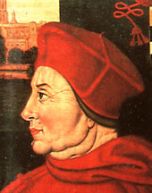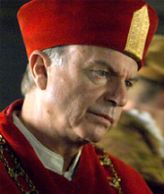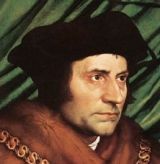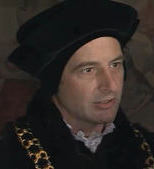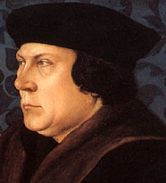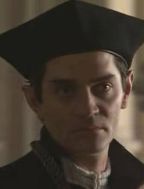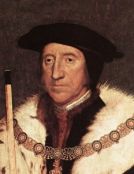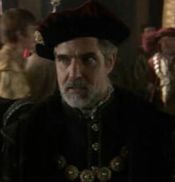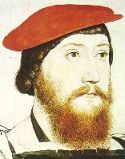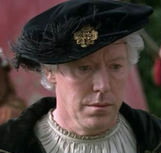MINISTERS of the King`s court
Jump to navigation
Jump to search
| "While good counsel was about him, and could be heard, the king did much good. So again, when sinister and wicked counsel, under subtle and crafty pretences, had gotten once the foot in, thrusting truth and verity out of the prince's ears,how much religion and all good things went prosperously forward before,so much, on the contrary side, all revolted backward again." [John Foxe - a near-contemporary ] |
| <embed height="350" src="http://widget.wetpaintserv.us/wiki/thetudorswiki/page/The+King%27s+Ministers/widget/youtubevideo/74623805d736521303235758b3db8dd1bc774ac8" type="application/x-shockwave-flash" width="425" wmode="transparent"/> Jonathan Rhys Meyers talks about his Character King Henry VIII's relationships with his ministers & court |
"..it is important to understand how his [Henry's] subjects even his most important subjects, viewed the king. To them he was divinely appointed, his role a partly sacred one even before the royal supremacy; his power over them was huge, and could (and frequently did) extend to imprisonment or death. He was not someone to be pushed around as a cabinet colleague might attempt to lobby a contemporary prime minister. He was someone to be approached with caution and reverence, to whom ideas might be suggested, but with humility and in anxious hope of approval. Cranmer's description of Cromwell, written in surprise and sadness after Cromwell's fall from grace, is a good description of the place of a minister in Henry's government : 'he that was so advanced by your majesty; he whose surety was only by your majesty, he who loved your majesty (as I ever thought) no less than God; he who studied always to set forwards whatsoever was your majesty's will and pleasure; he that cared for no man's displeasure to serve your majesty.' Henry's closest advisors, Wolsey and Cromwell, as well as many others, were entirely dependent on the king's favour for their very livelihood, and their chief concern was always to advance the king's will, not to subvert it." ~ Lucy Wooding's Henry VIII (2009) |
| The Premier Ministers | Dates & Titles | Accomplishments |
| as portrayed by Sam Neill Archbishop, Cardinal & Legate Wolsey was a man of the Church. This, more than anything else, was what contemporaries noted about him. For Wolsey managed to build up in a short space of years an accumulation of ecclesiastical power that was quite unprecedented in English history. His blatant ecclesiastical pluralism, enormous wealth, and lavish living plus his policy of raising money for England's wars by forced loans aroused considerable resentment. | born c. 1470 - died 1530 (aged 60) Lord High Chancellor 1515 - 1529 (14 years) During this period King Henry VIII was aged 24 - 38 yrs & Katherine of Aragon was the Queen His failure to obtain an annulment of the King's marriage to his first queen & his miscalculation of Anne Boleyn's influence on the King was his downfall. He would doubtless have been executed on false charges of treason had he not died a natural death on the way to London | - From 1514 to 1529 Wolsey virtually controlled domestic and foreign policy for the first half of the young Henry VIII's reign. - He successfully organized an army for the invasion of France in 1513, accompanied Henry on his campaign, and helped conclude the peace of 1514. And the "Cloth of Gold" summit with Francis I. - Dominated the legal system and presided over the House of Lords. - Overhauled royal taxation. - Restrained the influence of the king's young companions at the court, and kept a watchful eye on the pretensions of the nobility in the country at large. - His mastery of foreign affairs was second to none. - His greatest lasting monument is Hampton Court Palace. |
| as portrayed by Jeremy Northam Lawyer, Author & Humanist Scholar More's writing and scholarship earned him the reputation of being a great Christian Renaissance humanist. Despite his busy political career, he was a prolific writer. He viewed the Protestant heresy as a disease, a threat to the peace and unity of both church and society. | born 1478 - executed 1535 (aged 57) Lord High Chancellor 1529 - 1532 (3 years - but had been a member of the privy council since 1518) King Henry was aged 38 - 41 & Katherine of Aragon was the Queen, however Henry was betrothed to Anne Boleyn from 1527 & separated from Katherine in 1531. In April, 1534, More refused to swear to the Act of Succession & the Oath of Supremacy & was committed to the Tower of London on April 17. More was found guilty of treason and was beheaded on July 6, 1535 | - He was the first layman to hold the post of Lord Chancellor - As Speaker of the House of Commons, More helped establish the parliamentary privilege of free speech. -His chief concern was the eradication of Lutheran doctrine in the form of writings & anyone who collaborated with Tyndale. |
| as portrayed by James Frain Soldier, Accountant & Merchant Cromwell was blessed with a logical mind and unlike his royal master, he did not let his emotions interfere with his position. He was as great a statesman as England has ever seen and, in his decade of power, permanently changed the course of English history. | born c. 1485 - executed 1540 (aged 55) Secretary of State (The King's Secretary) 1533 - 1536 Lord Privy Seal 1536 - 1540 (total - 7 years) King Henry was aged 41 - 49 & Anne Boleyn, Jane Seymour & Anne of Cleves were the queens. He orchestrated the downfall of the Boleyns, however, his own downfall would be attributed to Anne Boleyn's uncle Thomas Howard, 3rd Duke of Norfolk. He was brutally executed by the King's orders for heresy. Later Henry would rage at his council, accusing them of lying and deliberately destroying his 'most faithful servant'. | - Establishment of the royal supremacy and the dissolution of the monasteries. - Founded the ministries of Augmentations and First Fruits to handle income from the dissolution - Founded the two courts of Wards and Surveyors which allowed more efficient taxation and leasing - Politically integrated the kingdom by extending sovereign authority into northern England, Wales & Ireland. - Used the power of that relatively new invention, the printing-press. Spearheaded the first propaganda campaign in English history. |
Other Prominent Ministers
| as portrayed by Henry Czerny Nobleman, Soldier & political survivor Leader of the Catholic faction, at first pushed the Boleyns forward but later changed to work against them. He was old-fashioned in religion and politics, and a conservative, unimpressed by the new ideas of the reformers and uncomfortable with the low born "new men" of the Tudor Court. He was ready to do whatever it took, even sacrifice his religion and his family, to retain the King's favour and further his ambitions. | born 1473 - died 1554 (aged 81) Lord High Treasurer succeeding his father 1524 - 1546 (22 years) In 1546 he and his son Henry Howard, Earl of Surrey were charged with treason & his son was beheaded however King Henry VIII died the day before the execution could be carried out on Thomas. He remained in prison during Edward VI's reign (7 years) and only released & restored to his dukedom when Mary I took the throne in 1553 | - Established himself as a man of importance with the Victory over the Scots at the Battle of Flodden Field. - engaged in the campaign against the Pilgrimage of the Grace despite being a staunch catholic. - he took possession of many religious houses at the Dissolution. |
| as portrayed by Nick Dunning Diplomat & Courtier | born 1477 - died 1539 (aged 62) Lord Privy Seal 1530 - 1536 | -He was one of Henry's leading diplomats & had been envoy to France, Spain & the Netherlands. - he had been very involved in the arrangements for the "Field of Cloth of Gold" in 1520 |
Sir Richard Rich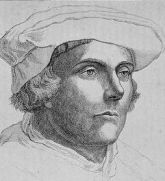 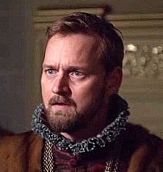 as portrayed by Rod Hallett Lawyer, Inquisitor & Political Survivor | born c. 1496 - 1567 (aged c.71) Solicitor General "lesser hammer" to Thomas Cromwell - in 1533 Speaker of the House of Commons 1536 King Henry was 45 and both Anne Boleyn & Jane Seymour were queens Chancellor of the court of Augmentations - established for the disposal of the monastic revenues - appointed in 1536 Lord Chancellor 1547 - 1551 during the reign of the young King Edward VI | - despite being heavily involved in the suppression of the monasteries remained catholic all his life. - known as a ruthless interrogator and tortured protestant heretics. - testified against, Sir Thomas More, Bishop John Fisher and Thomas Cromwell, Earl of Essex. Also involved in the prosecution of Bishop Stephen Gardiner. - was executor of King Henry VIII's will |
